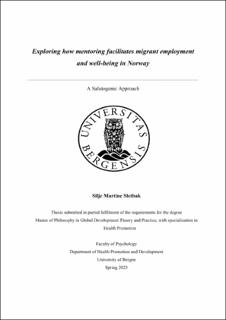Exploring how mentoring facilitates migrant employment and well-being in Norway: A Salutogenic Approach
Master thesis
Permanent lenke
https://hdl.handle.net/11250/3070426Utgivelsesdato
2023-05-30Metadata
Vis full innførselSamlinger
- Master theses [157]
Sammendrag
Highly skilled migrants experience challenges in securing relevant work in Norway. Education and work experience are considered essential for employment, however, migrants often remain either unemployed or underemployed. Recently, mentoring programs have received attention for contributing to higher labor market participation, but the mechanisms by which this occur is little researched. Likewise, the effect it has on migrants’ well-being is often overlooked. The key objective was to: Explore how a mentoring-to-work program contributes to migrants’ labor market integration and well-being. As such, this study adopts the theoretical approach of Salutogenesis to identify 1) stressors experienced by mentees regarding labor market integration, 2) the resistance resources to cope with stressors in relation to labor market integration and well-being, and 3) the mechanisms within mentoring that contribute to employment. This study followed a qualitative phenomenological approach. Semi-structured interviews were conducted with eight participants of a single mentoring-to-work program for migrants in Oslo, Norway. The mentees consisted of two refugees, two expat partners and one international student, all with higher education. In addition, two mentors and the leader of the program were interviewed. The findings suggest language proficiency, devalued education and work experience, discrimination, culture differences, and network to be the main stressors for integrating into the labor market. Educational background and personal strength, including social support and engaging in social activities were some of the resources the migrants used to cope with the stressors during their labor market integration. The mentors were specifically important in mobilizing migrants’ internal and external resources. They provided writing seminars on CVs, application letters and LinkedIn, but also knowledge on how to approach the Norwegian labor market and how to prepare for interviews. The findings cannot conclude whether the mentoring program increases migrants’ employment, however, it has positive implications on their employment goals.
